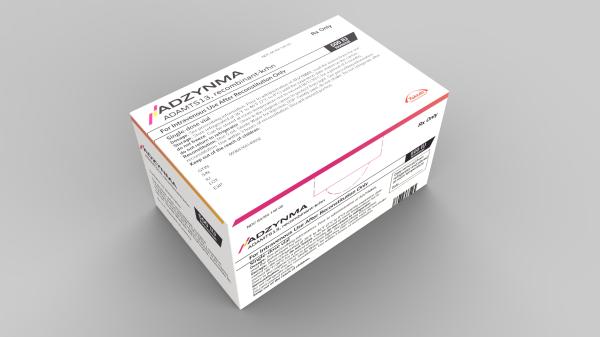Adzynma
Pronunciation: ad-zin-muh
Generic name: ADAMTS13, recombinant-krhn
Dosage form: Injection for intravenous infusion
Drug class: Lysosomal enzymes
What is Adzynma?
Adzynma (ADAMTS13, recombinant-krhn) is a human recombinant protein that may be used to prevent or treat blood clots by replacing missing or defective ADAMTS13 enzyme in adults and children with congenital thrombotic thrombocytopenic purpura (cTTP). It is given by a healthcare provider as a slow intravenous (into the vein) infusion.
Adzynma is a synthetic version of the ADAMTS13 protein that works by replacing the missing or defective ADAMSTS13 enzyme. In one study, patients who received a single 40 IU/kg intravenous infusion of Adzynma (n=23) showed a four- to five-fold rise in ADAMTS13 activity compared to traditional plasma-based treatments.
cTTP is a rare, chronic blood clotting disorder linked to low levels of the ADAMTS13 enzyme. It leads to serious events and ongoing symptoms, including low platelet count, hemolytic anemia, headaches, and abdominal pain. Without treatment, acute cTTP events have a mortality rate exceeding 90%.
Adzynma was FDA approved on November 9, 2023, making it the first recombinant ADAMTS13 treatment to be approved that addresses the root cause of cTTP.
Warnings
May cause hypersensitivity reactions, including anaphylaxis. Do not use in people who have experienced life-threatening hypersensitivity reactions to Adzynma or its components.
Your body can form inhibitors to ADAMTS13. An inhibitor is part of the body’s normal defense system. If you form inhibitors, they may stop Adzynma from working properly. Consult with your healthcare provider to make sure you are carefully monitored with blood tests for the development of inhibitors to ADAMTS13.
Before taking
Do not take Adzynma if you have had a life-threatening allergic reaction to it or any of the inactive ingredients in the vial.
Tell your healthcare provider about all of your medical conditions, including if you:
- have any allergies, including allergies to hamsters
- are pregnant or plan to become pregnant
- are breastfeeding or plan to breastfeed.
Pregnancy and breastfeeding
It is not known if Adzynma will harm your unborn baby. Tell your healthcare provider right away if you become pregnant.
It is not known if Adzynma passes into breast milk. Talk to your healthcare provider about the best way to feed your baby.
How is Adzynma administered?
Adzynma is administered by slow intravenous infusion at a rate of 2 to 4mL per minute and is given by a healthcare provider.
Your healthcare provider will calculate the dose you need based on your body weight using the actual potency (and not the nominated potency) printed on the Adzynma vial.
Prophylactic dosage
The recommended prophylactic dosage regimen is 40 IU/kg body weight once every other week.
This may be adjusted to 40 IU/kg body weight once weekly based on prior prophylactic dosing regimen or clinical response.
On-demand dosage
The recommended on-demand regimen is:
- 40 IU/kg body weight on day 1
- 20 IU/kg body weight on day 2
- 15 IU/kg body weight on day 3 and beyond until two days after the acute event is resolved.
What are the side effects of Adzynma?
Adzynma may cause an allergic reaction. Call your healthcare provider right away and stop treatment if you get a rash or hives, itching, tightness of the throat, chest pain or tightness, difficulty breathing, lightheadedness, dizziness, nausea, or fainting.
The most common side effects reported with Adzynmaa affecting more than 5% of people include headache, diarrhea, migraine, abdominal pain, nausea, upper respiratory tract infection, dizziness, and vomiting.
Tell your healthcare provider about any side effect that bothers you or does not go away. These are not all of the possible side effects of Adzynma. For more information, ask your healthcare provider or pharmacist. You may report side effects to the FDA at 1-800-FDA-1088.
What other drugs will affect Adzynma?
Tell your healthcare provider about all the medicines you take, including prescription medicines and over-the-counter medicines, vitamins, and herbal supplements.
Adzynma ingredients
Active: recombinant ADAMTS13.
Inactive: sodium chloride, calcium chloride dihydrate, L-histidine, mannitol, sucrose, and polysorbate 80.
Each vial is labeled with the actual rADAMTS13 activity, measured in terms of its potency in International Units (IU). Available as a lyophilized powder in single-dose vials containing nominally 500 or 1500 IU.
Storage
Store Adzynma in the refrigerator at 2°C to 8°C (36°F to 46°F) for up to 36 months from the date of manufacture until the expiration date stated on the vial label and carton.
Adzyma may be stored at room temperature (not exceeding 30°C/86°F) for a period of up to 6 months. After storage at room temperature, do not return to the refrigerator.
Do not use it beyond the expiration date printed on the vial label or carton or if not stored properly.
Do not freeze.
Store in the original box and protect from extreme exposure to light.
Use the reconstituted product immediately or within 3 hours after reconstitution when stored at room temperature. Do not use if the solution in the syringe is cloudy or contains particles
Manufacturer
Takeda Pharmaceuticals U.S.A., Inc.
References
More about Adzynma (apadamtase alfa, recombinant)
- Compare alternatives
- Pricing & coupons
- Reviews (1)
- Drug images
- Side effects
- Dosage information
- During pregnancy
- FDA approval history
- Drug class: lysosomal enzymes
- En español
Professional resources
Related treatment guides
Further information
Always consult your healthcare provider to ensure the information displayed on this page applies to your personal circumstances.

